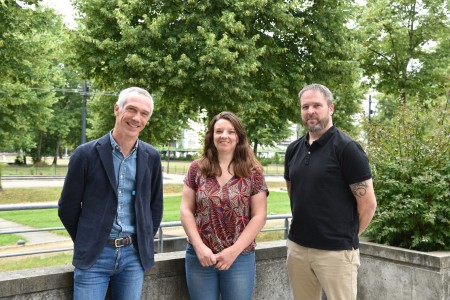An ambitious European programme to attract international doctoral students
With the support of the European Commission, the BREATH research project co-finances a doctoral training programme combining human and social sciences with health disciplines for twenty young researchers from the universities of Angers, Nantes and Le Mans. The project started in September 2025.

Nicolas Clere, Claire Manceau and Sébastien Fleuret.The Breath project is a response to the Horizon Europe programme, led by the University of Angers, which has already funded nine research projects through the Marie Sklodowska-Curie Actions since 2021. The aim is to increase the attractiveness of doctoral studies in the region.
"It's an ambitious project that brings together six doctoral schools and 54 laboratories from the three Loire universities, with the support of 28 partners," explains Sébastien Fleuret, research director of the ESO laboratory and scientific coordinator of the project. "The training will include support for professional projects to open doors for future PhDs both inside and outside the academic world, towards the business world and civil society".
Claire Manceau, head of the Cap Europe department, added: "The award of the Human Resources Strategy for Researchers (HRS4R) label at the UA in 2020, which recognises the efforts made to welcome doctoral students and researchers, helped us win this project. With this programme of excellence, we will be able to attract top-level doctoral students." Nicolas Clere, director of the Angers doctoral department, continued: "After all, future health professionals need human and social science knowledge in their training, for example to provide them with the tools to overcome medical deserts."
A 5-year project
The various human and social science laboratories and university health laboratories are encouraged to submit topics in the following areas: health technology and disease prevention, inclusive and democratic societies, quality of life and virtuous ecosystems, health and care systems, etc. These topics will be evaluated by a panel of experts. Twenty projects will be funded in two cohorts (ten in September 2025 and ten the following year). The programme is open to foreign doctoral candidates. It is also open to candidates who have studied outside of France for at least one year within the last three years.
In addition to their dissertation, they will receive training in English on various topics (ethics, responsible and sustainable research, innovation, and entrepreneurship). They will also be required to complete a three-month internship in a non-academic and/or international setting. They will participate in international conferences and scientific mediation activities, for example with Atelier Kawa, which has already collaborated with UA researchers on the publication of Carnets mêlés. In return, the doctoral students will commit to completing their thesis within three years.
The BREATH project is a five-year project with a budget of 5 million euros, half of which is European Commission funding.
The partners: Nantes Université, Le Mans Université, Région Pays de la Loire, Angers Loire Métropole, Nantes Métropole, Le Mans Métropole, Centich Vyv3, Universita Degli Studi di Parma (Italie), The University of Ottawa (Canada), Otto von Guericke University Magdeburg (Germany), Unisanté (Switzerland), Universidad de Extremadura (Spain), Wrocław University of Environmental and Life Sciences (Poland), EHMA (Belgium), Ligue contre le Cancer – Maine-et-Loire, Smart Macadam, Centre hospitalier Le Mans, Centre hospitalier de Nantes, Centre hospitalier universitaire Angers, Reference Site Collaborative Network (Belgium), Groupement national de coopération - Handicaps rares, ACAP 22, Klaster LifeScience Krakow (Poland), Angers Technopole, Atlanpôle Biothérapies, Association Report’Cité, Atelier Kawa, Association Bernard-Grégory, CNRS.
